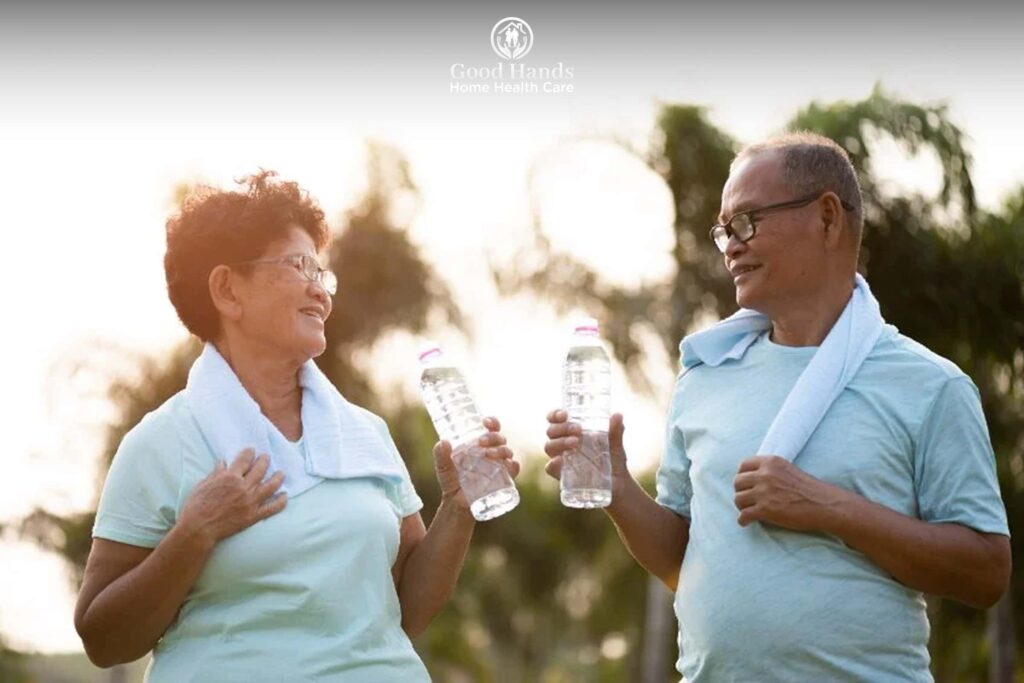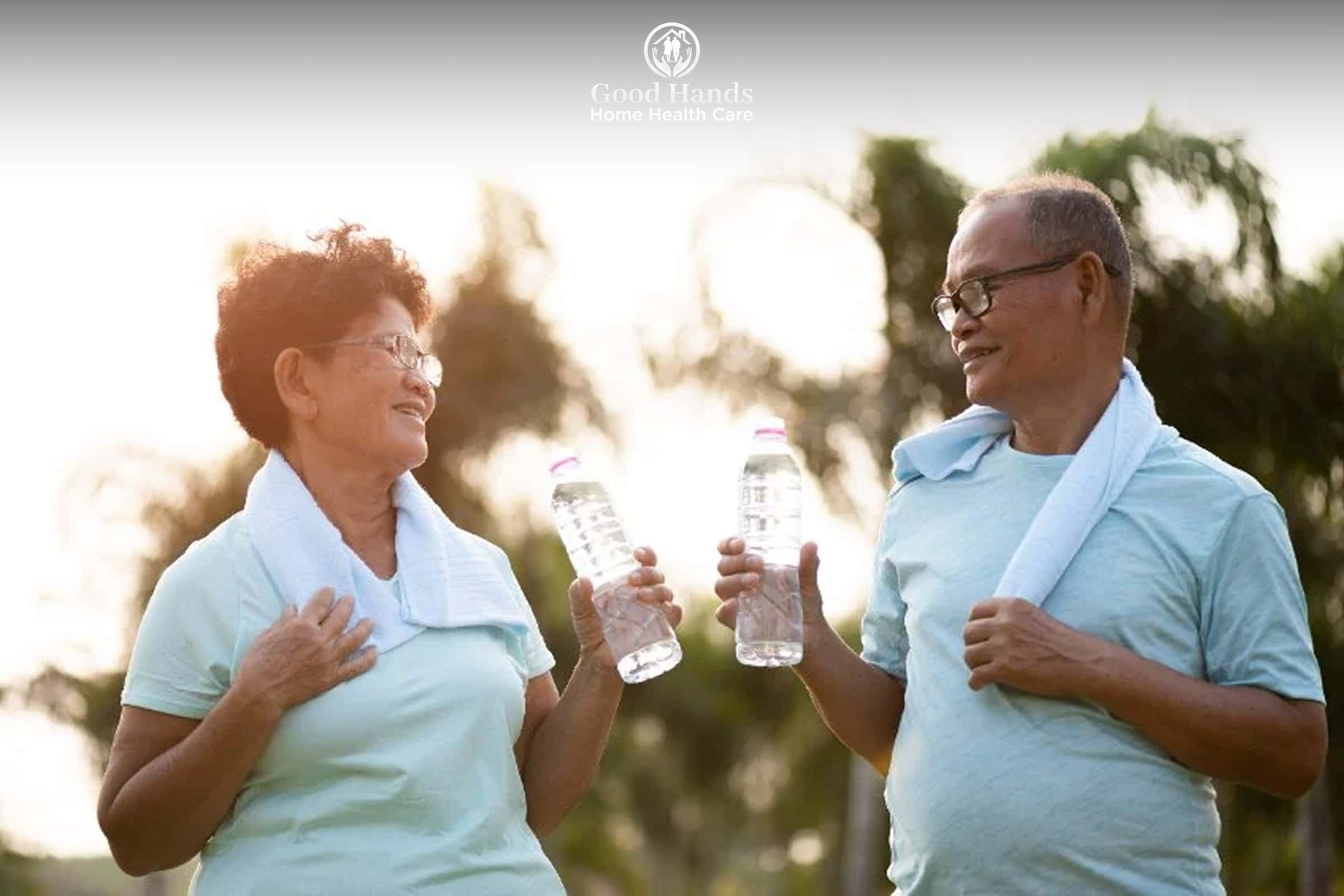Blog

The Importance of Staying Hydrated After 60

The Importance of Staying Hydrated After 60
Discover why consistent fluid consumption is fundamental for maintaining energy levels, cognitive sharpness, and holistic wellness among seniors. At Good Hands Home Health Care, we recognize that sufficient hydration becomes increasingly vital as we journey through our golden years, directly influencing everything from how effectively medications work to preventing dangerous falls and supporting overall vitality. Finding practical approaches to stay hydrated after 60 transforms into an essential component of daily wellness management.
Why Hydration Is Crucial for Seniors
Optimal fluid equilibrium serves as the foundation for senior health and hydration management. As we advance in years, our physiology undergoes remarkable transformations that influence how we process and conserve liquids. The percentage of water within our body composition naturally diminishes, amplifying the consequences of even slight dehydration into potentially serious health concerns.
The obstacle many individuals confront as they stay hydrated after 60 stems from the body’s diminished ability to signal thirst appropriately. This reduced thirst perception frequently means older adults don’t experience the sensation of thirst until dehydration has already taken hold. Furthermore, various prescription medications, declining kidney efficiency, and heightened moisture loss through the skin all contribute to elevated dehydration vulnerability, potentially triggering urinary system infections, mental function decline, and heightened falling hazards. Grasping appropriate water intake for older adults becomes indispensable in avoiding these complications.
Common Signs of Dehydration in the Elderly
Identifying elderly dehydration signs in their early stages can avert serious complications that might otherwise necessitate hospital admission. Family members and caregiving professionals should remain attentive to both subtle cues and obvious indicators that liquid consumption requires attention.
Physical and Cognitive Warning Signs:
- Parched mouth, fissured lips, or adhesive tongue texture.
- Deep amber or brown-tinged urine coloration.
- Lightheadedness upon standing or general instability.
- Atypical exhaustion or abrupt energy depletion.
- Reduced skin resilience (skin failing to rebound when gently pinched).
- Persistent headaches that intensify throughout the day.
- Mental disorientation, increased agitation, or perceptible emotional shifts.
When dehydration advances, it can dramatically worsen existing health conditions. For individuals living with diabetes, blood glucose regulation becomes more challenging. Cardiac patients may experience additional strain on their cardiovascular systems, while those managing arthritis frequently report more severe joint discomfort and rigidity when fluid levels become insufficient. Healthcare specialists routinely assess specific elderly dehydration signs when evaluating comprehensive health status during scheduled examinations.
How Much Water Do Seniors Need?
Comprehending the suitable water intake for older adults involves more than adhering to universal guidelines. While medical experts typically advocate for 6-8 cups (1.5-2 liters) daily, personal requirements fluctuate based on body mass, physical activity frequency, health conditions, and even the regional climate of your residence.
Numerous seniors utilize medications that influence hydration—some inducing increased urination, others demanding additional fluids for optimal absorption. At Good Hands Home Health Care, we advocate consulting with healthcare specialists regarding individual requirements, particularly for those managing cardiac insufficiency, kidney disorders, or taking water pills. During illness episodes featuring elevated temperature or digestive disturbances, fluid requirements typically escalate to counterbalance additional losses.
Best Fluids for the Aging Body
Choosing optimal fluids for aging body systems enhances nutritional advantages while bolstering overall health. While straightforward water remains the premier choice, enriching your daily regimen with variety can make sustaining proper consumption more pleasurable.
One of the most valuable hydration tips for seniors involves introducing diversity in liquid sources. Beyond standard water, consider nutrient-dense alternatives like reduced-fat milk, which delivers calcium alongside hydration, or transparent broths that provide both moisture and essential electrolytes. Plant-based teas (especially those without caffeine) can be comforting while contributing to daily hydration goals. Be cautious of beverages that might counteract hydration efforts—minimize coffee, alcoholic drinks, and sugar-laden beverages, which can actually promote fluid elimination through their diuretic properties. Selecting appropriate fluids for an aging body maintains optimal cellular operations and enhances medication efficacy.
Easy Ways to Stay Hydrated Daily
Establishing straightforward, sustainable practices helps seniors preserve adequate hydration without feeling burdened by yet another wellness obligation. The solution lies in making liquids readily available, enticing, and incorporated into existing daily patterns.
Among the most practical recommendations is carrying a dedicated container throughout your day. Seek options with volume indicators and ergonomic designs for hands affected by arthritis. If plain liquids seem uninteresting, natural flavor enhancers like cucumber slices, fresh berries, or citrus segments can increase appeal. Consuming moisture-rich foods contributes significantly—watermelon, citrus fruits, cucumber, and savory broths all meaningfully support proper hydration. Implementing consistent hydration tips for seniors can substantially enhance vitality and mental clarity.
Creating a Personal Hydration Routine
Establishing regular patterns helps guarantee sufficient fluid maintenance throughout the day, transforming hydration from an afterthought into a priority. An individualized approach proves most effective, as each person maintains unique preferences, schedules, and wellness considerations.
Effective Strategies:
- Begin each morning with a complete glass of liquid before your first meal.
- Utilize mealtimes as natural reminders for consumption.
- Position visible prompts on phones, timepieces, or refrigerator notices.
- Purchase an intelligent container that monitors consumption and offers gentle reminders.
- Link drinking habits with routine activities like medication schedules or favorite television programs.
Family members and caregivers fulfill a crucial function in supporting proper fluid balance, particularly for seniors experiencing cognitive challenges. Consistent monitoring and gentle encouragement rather than criticism prove essential. When caregivers understand the unique requirements and preferences of their loved ones, they can deliver appropriate support while honoring independence. Senior health and hydration function inseparably, establishing the groundwork for comprehensive wellness and self-sufficiency.
Final Thoughts on Staying Hydrated After 60
Preserving proper moisture equilibrium represents one of the simplest yet most powerful wellness interventions accessible to older adults. When you maintain adequate hydration past sixty, you nurture virtually every bodily system—from brain function and digestive processes to blood circulation and temperature management.
Making fluid maintenance a cornerstone of senior health and hydration yields remarkable benefits. Your vitality improves, medications function more effectively, and your physiology strengthens against common ailments. Remember that requirements fluctuate with seasonal changes and activity intensity. Exercise particular vigilance during summer months when your body demands increased liquids. By prioritizing proper intake, you’re investing directly in your vitality, independence, and quality of life.
Get Professional Hydration Support
Need assistance managing fluid intake for yourself or a loved one? Connect with our care specialists today for customized plans and compassionate senior support tailored to individual requirements.









